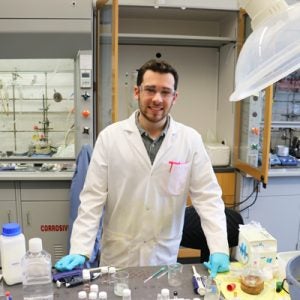
Participating in a dig in Cyprus, cleaning, analyzing, and sorting Byzantine-era mosaics. Getting research published in a premier Chemistry journal. Creating and performing a piece of theatre with 15-18 year-olds to discuss issues of crime, violence, and sexual assault in their communities. These opportunities were among those afforded to twelve undergraduate students through the inaugural A&S Fellows Program in summer 2018. The College of Arts and Sciences sponsors the program for students to work under the mentorship of a full-time URI faculty member in an area of research, scholarship, or creative work. For ten weeks during the summer, students are given the opportunity to either work on a project their faculty mentor is pursuing or one the student has proposed. The possibilities are endless.
For undergraduate students, these unique, hands-on projects are often the key to finding employment after graduation, their ticket into their choice of graduate school, or simply a way to gain important clarity about they want to pursue in the future. Students are able to work 10-20 hours per week in the summer earning a stipend just as they would for a paid internship. Students submit applications to the College Research, Scholarship, and Creative Work Committee to become fellows, and committee members select them based on the student’s preparation to make use of the fellowship opportunity, the educational benefit to the student, and the benefit to the faculty mentor.
The feedback we received from the inaugural session of the fellows program reinforces the need for and value of such an initiative: “I found the A&S Fellows Program to be a prime opportunity for individual, self-directed, and self-motivated study, which can be uncommon as an undergraduate student,” says Tim Sanzi ‘20, who completed a fellowship at Trinity College in Dublin, Ireland, exploring the intersection of identity and heritage through creative writing.
“I learned the skills necessary for each step of research, from writing the project proposal to analyzing data,” says Kate Fish ‘20. “I am very grateful for the fellowship and all of the learning opportunities that have come with it.” Working with collections at the Harvard Museum of Natural History and the Museum of Comparative Zoology, Fish explored how tail anatomy can help distinguish dog skeletons from wolf skeletons in pursuit of a new method for identifying the earliest domestic dogs in the archaeological record.
Joe Essig ‘19, studied factors that can explain people’s behavior toward affordable housing policies and ballot questions. He explains the impact his mentor, Dr. Shanna Pearson-Merkowitz, Associate Professor in Political Science and Director of the Social Science Institute for Research, Education, and Policy, had on him by saying: “My mentor has been a great help to me, not only in giving me this great opportunity to get an idea of real political science research before grad school, but also in guiding my questions and teaching me how to use different techniques, while still allowing me independence.”
